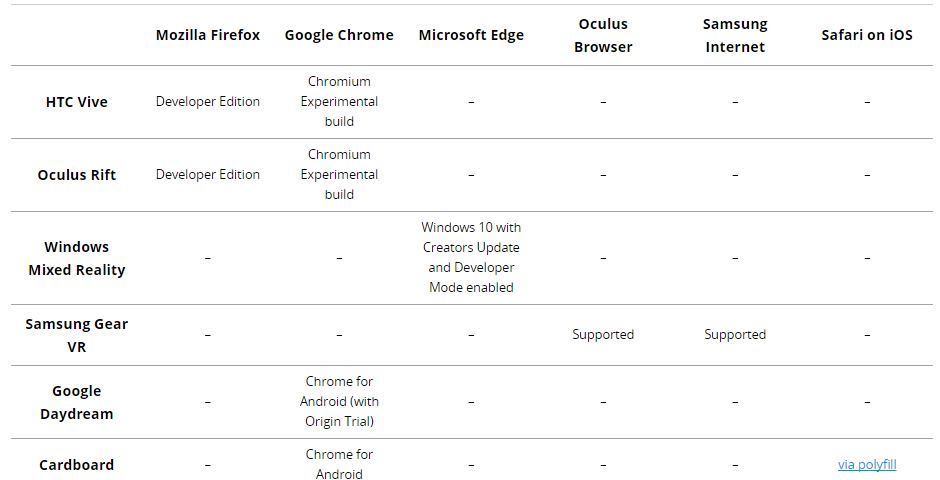Firefox 55 Will Support WebVR By Default This August (Updated)

Update, 8/8/17, 6:25am PT: Firefox 55 is set to debut today with support for WebVR. Mozilla said in a developer update that WebVR support will be enabled by default on Windows, but macOS users will have to install a nightly build of the browser to use the API. You can find those builds (as well as beta and developer builds) on the Firefox website.
Original article: 6/1/17, 11:30am PT:
Mozilla announced that it will enable the WebVR API by default in Firefox version 55, due for release on August 8.
Virtual Reality On The Web
The WebVR API was born out of a necessity to enable virtual reality experiences on the web. For instance, Google Cardboard, HTC Vive, or Oculus Rift owners could use their devices to experience virtual reality content packaged by a web game or web app. This should make VR more accessible to a larger number of people, which could also make developers more interested in creating VR content.
Mozilla and Google have been working closely together for more than a year on the WebVR API. The two announced the first version of the proposed WebVR specification in March 2016. A few months later, Microsoft also announced that it would support the standard in its Edge browser.
WebVR Progress
Initially, WebVR support will arrive only on the Windows version of Firefox. Mozilla encouraged developers to use technologies such as the WebGL 3D graphics API, and tools for building VR content such as the A-Frame or React VR.
Mozilla said that in the next few months all the major browser vendors will be working to ensure their browsers pass the WebVR compliance tests. Right now, Apple doesn't seem to officially support the specification in its Safari browser, but it may be preparing an announcement at the next WorldWide Developers Conference (WWDC), which starts on June 5.
Stay On the Cutting Edge: Get the Tom's Hardware Newsletter
Get Tom's Hardware's best news and in-depth reviews, straight to your inbox.

For now, other than Mozilla, Microsoft seems to have taken the lead in passing the compliance tests for WebVR 1.1. Microsoft has recently made some major VR-related announcements for its Windows Mixed Reality platform. The platform seems to focus on VR capabilities for the moment, but it could potentially expand to include support for augmented reality, too, in the future.
Version 2.0 of the WebVR specification seems to be still in the draft stage right now, and browser vendors are recommended to avoid trying to implement it before the specification is more stable.
-
bit_user Do any of these browsers support viewing this content on a 2D monitor + mouse & keyboard? The vast majority of PC users still don't have HMDs, and I'm sure there's a fair amount of VR content that could reasonably be experienced on a conventional FPS-gaming type setup.Reply
-
TheOtherOne When did we get to the version number that high?Reply
Few years ago it was in 10s and now FIFTY FIVE! -
bit_user Reply
At some point, they started sequentially numbering releases.19764603 said:When did we get to the version number that high?
Few years ago it was in 10s and now FIFTY FIVE! -
bit_user Reply
Yes, exactly. I've been wondering whether that is/will be supported, as well.19765730 said:WebVR... hmmm... VRML... anyone remember that? :).
It's probably not worth it, though. Surely no programmable shaders and only single-pass rendering.
-
hst101rox How about making Firefox more CPU efficient? Runs so slow on Android versus Chrome page rendering... and slower on x86 too but not as bad.Reply -
Kennyy Evony already removed firefox on android. its a ram hog and space hog not worth running it. if they clean up the code and make it a lite version and faster than samsung internet i'd switch back but not before.Reply
